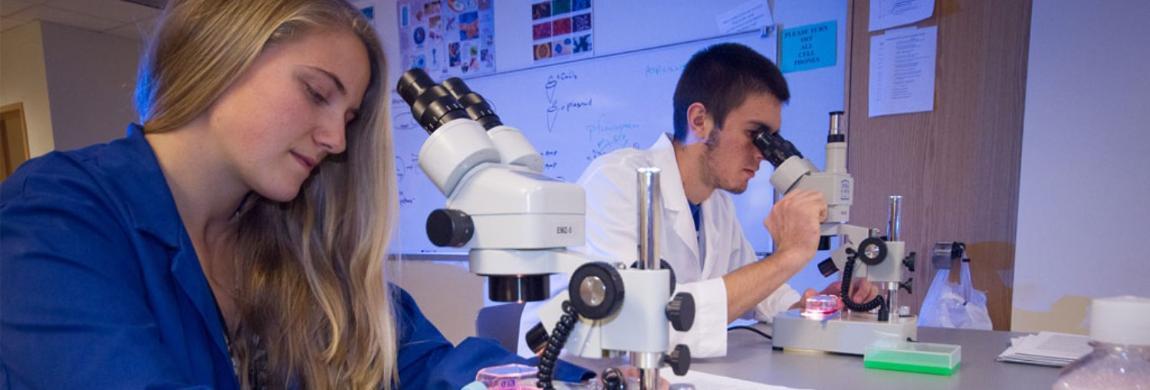Personal support and mentoring from faculty. Special opportunities inside and outside the classroom. The kind of supportive and nurturing learning community you won’t find at big research universities.
Call it teaching science the Longwood way, and the National Science Foundation is making a major investment in the approach. The NSF has announced it will award Longwood a $650,000 grant – the second-largest federal grant in Longwood’s history—to launch a new program building on the university’s teaching strength and providing financial and academic support for students in the sciences.
The grant will financially support 24 Longwood students throughout their undergraduate careers in one of the STEM (science, technology, engineering and math) majors. Called LIFE STEM (Longwood Initiative for Future Excellence in STEM), the program will provide scholarships and special academic programming designed not only to keep students on track in their majors but also provide critical professional development for postgraduate success. The program will focus on recruiting underrepresented minorities and scholars from Southside Virginia.
"The program this grant supports is a natural fit for Longwood," said Provost Dr. Joan Neff. "It combines a firm foundation in citizen leadership with comprehensive academic support in one of the fastest-growing areas of study in the country. As we move forward, it could provide a template from which we can build courses and initiatives across our curriculum."
The experiential, in-the-field learning that has long been a hallmark of a Longwood education will be present from the outset. Students accepted into the new program will spend a week the summer before their first semester at Hull Springs Farm, a 662-acre farm in Westmoreland County near the Chesapeake Bay. There they will begin to develop a foothold in scientific techniques that will form the foundation of their studies at Longwood.
"Students in the LIFE STEM program will begin their academic careers thinking about stewardship and how the work of varied science disciplines connects to larger issues with the Chesapeake Bay," said Dr. Alix Fink, the Mark Boyd Sharp and Wilma Register Sharp Dean of the Cormier Honors College for Citizen Scholars, who helped spearhead the grant. "We’re starting with citizen leadership on the front end and building on those principles to infuse the students’ undergraduate careers with a sense of inquiry and purpose."
"The LIFE STEM program incorporates many of the best practices research identifies as critical to help students transition successfully and graduate from Longwood."
Dr. Jennifer Green
LIFE STEM students will reside with Cormier Honors College students in a common residence hall and enjoy many of the same benefits as that academic community, from a collaborative residential experience to an annual leadership retreat.
"The program brings an interdisciplinary approach to learning foundational scientific skills," said Dr. Michelle Parry, associate professor of physics, who led the grant proposal. "In addition to being broad-based, it’s collaborative. Students will work together to learn these skills, which goes a long way toward building the kind of academic communities that we pride ourselves on."
The program takes a holistic approach to a STEM education, starting with the Hull Springs Farm experience. During their freshman year, students will take "entering research" classes designed to build a toolbox of scientific skills. At the same time, they will be learning how to develop and act on a sense of inquiry.
"The grant was really built around the idea of a lifetime of science," said Dr. Wade Znosko, assistant professor of biology, who will teach the entering research classes. "The first year of study is built around learning how to think like a scientist—approaching complex real-world questions with a toolbox of interdisciplinary techniques that prepare [students] for future STEM careers."
Additionally, students will be assigned faculty mentors who will meet with them regularly and guide them through their academic careers. The grant also funds student travel to attend or present original research at professional conferences. Program organizers hope to develop stronger relationships with STEM professionals in the region to gain valuable perspective on employment opportunities and expectations, but they also see the grant as a powerful tool for the university that touches more than just the science departments.
"The vast benefits of this grant extend beyond STEM classrooms," said Parry. "Longwood as an institution will learn valuable lessons about mentoring, academic support, career preparation and professional development that are applicable to all of our academic endeavors."
Working with area K-12 partners, Longwood will identify students interested in studying the sciences—LIFE STEM includes chemistry, physics, biology and environmental science—and invite them to apply for the program. Need-based scholarships will be awarded to accepted students. The first class of 12 students will enter in fall 2017. A second class of 12 students will enter in fall 2018.
"Across the country, colleges and universities face a challenge of retaining STEM students, both in their disciplines and in the institution," said Dr. Jennifer Green, associate vice president for enrollment management. "The LIFE STEM program incorporates many of the best practices research identifies as critical to help students transition successfully and graduate from Longwood. The holistic approach of infusing these best practices in the daily activities of the students will be instrumental in attracting students to the STEM programs at Longwood and providing the guidance and support to be successful and grow toward their own ideals."



Leave a Comment